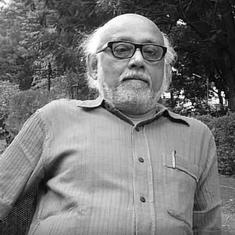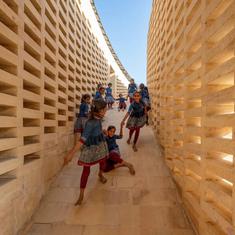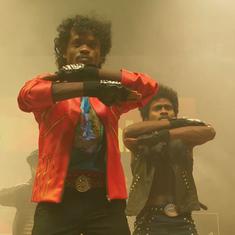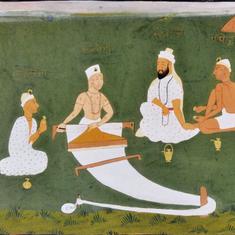Zaiba could not visit her place of birth for 45 years even though she has lived only 30 km away from it all this while. When she finally managed to make it to her native village of Chalunka on August 29 last year, she found her 96-year-old mother, Khatibee, paralysed and unable to see anything.
Zaiba’s journey back home was delayed because of a contentious line in the snow that separates the Pakistan-administered Gilgit-Baltistan region from the India-administered area of Leh – both once part of Jammu and Kashmir. Chalunka was on Pakistan’s side till December 1971 when the two countries went to war and the Indian army captured the village along with a few other settlements in the area.
Leaving her parents and siblings behind, Zaiba had migrated with her husband to Thoqmus – a village 30 km to the West in the Pakistani-controlled territory. She did not realise she will have to wait four and a half decades – and undertake a long cross-border journey of more than 3,000 km – to cover that small distance.

Zaiba’s children and other relatives worked for quite some time to procure documents – and about 400,000 rupees – so that she could travel back to Chalunka. “When we first applied for an Indian visa for her in November 2015, the application was rejected,” said Ilyas Hussain, Zaiba’s nephew who lives in Skardu, one of the two main towns in Gilgit-Baltistan region (Gilgit being the other). “We applied a couple of times again. There was always some document missing,” he says as he explains reasons for delays in the visa process.
It was only with the help from Zaiba’s brother, Hussain Ali, who lives in Chalunka, that the missing documents were finally arranged in June 2016. By that time she was already receiving messages that her mother was critically ill.
Ilyas Hussain collected all the required documents and travelled to Islamabad to submit her visa application once again at the Indian High Commission. In early August last year, he received a call from the high commission that Zaiba’s visa had been approved.
A long journey
Zaiba, a small woman approaching 60, had thus far only travelled to the nearby city of Skardu since her arrival in Thoqmus in 1971. She needed someone to escort her outside Gilgit-Baltistan. “She knows nothing about how things in big cities work,” says Ilyas Hussain.
He travelled with her to take her first to Islamabad and then to Lahore where she was to cross the Wagah-Attari border to move into India.
She left Thoqmus on August 18 and stopped over in Skardu for a few days. There, she collected messages and gifts from her relatives and fellow villagers who, like her, had all left parts of their families behind in Chalunka. They were all excited about her trip. She herself went gift shopping one day ahead of her departure on the next leg of her journey to Islamabad. “I bought a shawl and a dress for my mother as well as dresses for my brothers’ wives and Balti caps for my brothers,” Zaiba said afterwards.
Tourist season in Gilgit-Baltistan was at its peak then. Flights to and from Islamabad were all overbooked. Zaiba and Ilyas Hussain had to hire a taxi.

When the two left Skardu on August 23, their entire family – including Zaiba’s three sons and three daughters – was there to see them off even though it was 4 am in the morning. Her heavily lined oval face and greying hair – always draped in a shawl – made her look older than she is but she had no trace of sadness about her at the time, no tears in her eyes. She, indeed, was happy that she was finally going back home to be with her mother and siblings.
After Zaiba and Ilyas Hussain reached Islamabad at the end of a 20-hour long car ride, he collected her passport from a relative who had already picked it up from the Indian High Commission. The two stayed in Islamabad for a couple of days and then travelled to Lahore, where he purchased a Lahore-Delhi bus ticket for her.

The bus, operated by the Pakistan Tourism Development Corporation, was scheduled to leave at 4 am on August 26. Security was tight around the terminal within Lahore’s Gulberg area (next to Liberty Market). Passengers lined up in front of the entrance for last minute inspections. Their baggage was scanned thoroughly before they were allowed to board.
A police escort, its sirens blaring and emergency lights flickering, accompanied the bus to the Wagah border checkpoint – about 22 km to the East of Lahore – where it stopped for a scrutiny of the passengers’ travel documents and an assessment of their baggage by the Pakistani officials. The bus then drove into India and stopped for another round of document checks and baggage assessment – this time by the India officials. It finally reached Delhi the same evening.
Hussain Ali was at the bus terminal with his wife and sons to receive his sister. “She fainted as she got off the bus in Delhi,” Ilyas Hussain recounts the details of her arrival that he has received from Hussain Ali. “She was both happy and sad.”
Zaiba, her brother and his family took a flight to Leh next morning. They stayed there for two days and finally went to Chalunka by road. On August 29, she reached the place where she was born – having spent 11 days on the way and her entire adult life away from it. She was only a teenager when she had left Chalunka.
The landscape, cuisine, culture, architecture, language and people in Chalunka and its nearby village of Turtuk appear exactly the same as in eastern parts of Gilgit-Baltistan where Thoqmus and Skardu are located. The invisible line that divides the territory into two has failed to obliterate the common roots of its inhabitants.
When states fight over territory and governments bicker over geography, lives are lost, children are separated from their parents and people get split into different countries. Call it collateral damage. Zaiba’s story of separation from her mother is a part of that collateral damage.

The homecoming
Long after she moved to Thoqmus, Zaiba did not know what had happened to her parents and siblings. “After seven years of separation I learnt that my parents and siblings were in Chalunka. I was extremely happy to know that they were alive and that the Indian government was taking very good care of my family,” she said in a recent interview in Chalunka.
Zaiba arrived in India on a 30-day single entry visa – which has been extended multiple times after her arrival. “Getting to Chalunka was very exhausting and tiresome but I was looking forward to seeing my mother throughout the way; that made the journey a lot easier,” she said.
She is living with her mother who cannot leave her bed on her own. Being the only daughter of her parents, Zaiba wants to take care of her mother as long as she can. Her father passed away several years ago and she regrets that she could not look after him before he died. She does not want to live the rest of her life feeling the same regarding her mother.
Zaiba received a grand reception in Chalunka. She was garlanded upon arrival, an event that the entire village celebrated. Everyone wanted to invite her for a meal.
She, too, is extremely happy to return to the village where she was born and meet the people she grew up with. She often takes walks around Chalunka and visits places where she used to play in her younger days – as if she is reliving her childhood all over again.
But she also knows that one day she will have to leave all this behind one more time to go back to her children and grandchildren in Thoqmus. “I know that I am Pakistani and my mother is Hindustani. I also do not want to live here longer for any other reason than to look after my mother,” said Zaiba, with tears in her eyes. “I just do not feel like leaving her.”
This article first appeared on Herald.










